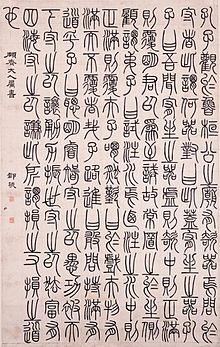
Back Xunzi (libro) Spanish 순자 (책) Korean Sün-c’ (kniha) Slovak 荀子(书) WUU 荀子 (書) Chinese 荀子 (書) ZH-CLASSICAL 荀子 ZH-YUE
 Text from the Xunzi in seal script | |
| Author | Xun Kuang (trad.) |
|---|---|
| Original title | 荀子 |
| Country | China |
| Language | Classical Chinese |
| Genre | Philosophy |
Publication date | c. 3rd century BCE |
| Xunzi | |||||||||||||||||||||||||||||||||||||||
|---|---|---|---|---|---|---|---|---|---|---|---|---|---|---|---|---|---|---|---|---|---|---|---|---|---|---|---|---|---|---|---|---|---|---|---|---|---|---|---|
| Chinese | 荀子 | ||||||||||||||||||||||||||||||||||||||
| Literal meaning | "[The Writings of] Master Xun" | ||||||||||||||||||||||||||||||||||||||
| |||||||||||||||||||||||||||||||||||||||

The Xunzi (Chinese: 荀子) is an ancient Chinese collection of philosophical writings attributed to and named after Xun Kuang, a 3rd-century BCE philosopher usually associated with the Confucian tradition. The Xunzi emphasizes education and propriety, and asserts that "human nature is detestable".[1] The text is an important source of early theories of ritual,[2] cosmology, and governance. The ideas within the Xunzi are thought to have exerted a strong influence on Legalist thinkers, such as Han Fei, and laid the groundwork for much of Han dynasty political ideology.[3] The text criticizes a wide range of other prominent early Chinese thinkers, including Laozi, Zhuangzi, Mozi, and Mencius.
Some Xunzi chapters are especially significant.[4] The "Discussion of Heaven (天論 Tiān lùn)" rejects the notion that heaven has a moral will. Instead, Xunzi asserts that heaven operates according to constant principles; thus people should focus on the human, social realm rather than attempting to ascertain the inner-workings of heaven. The "Discussion of Ritual Propriety (禮 lĭ)" chapter gives rules of individual and social decorum. "Dispelling Obsessions" teaches that in focusing on only one aspect of a situation, one often loses sight of the larger purpose. "Proper Use of Terms" (正名 zhēngmíng): A name becomes proper for a situation through conventional usage, but once this is fixed it is improper to deviate from this norm. "Human Dispositions are Detestable" (xìng è 性惡) rejects Mencius's claim that people have a natural inclination toward goodness. Confucius, who simply said that people are similar by nature, was not clear on the matter. Xunzi holds that man is naturally inclined towards selfishness, and that if this inclination is not curbed, human societies devolve into chaos. He argues that people become good only through conscious efforts and social constructs, emphasizing the difference between natural endowment and cultivated potential.
In the first century AD, Liu Xiang redacted Xunzi's extant oeuvre from hundreds of loose fascicles into 32 bundles of bamboo strips. The first commentary on the Xunzi does not appear until 818 AD, when an official named Yang Liang claimed to have corrected errors in the existing bamboo strips and transcribed them on scrolls of silk.[5] Yang's commentary still appears in some modern editions of the text. The text has been continuously in print since the invention of the printing press in the 11th century AD.
- ^ Ebrey 2006, pp. 45–49.
- ^ Berkson 2014, pp. 107–34.
- ^ Nylan 2016.
- ^ Graham 1989.
- ^ Knoblock 1988, p. 112.
© MMXXIII Rich X Search. We shall prevail. All rights reserved. Rich X Search